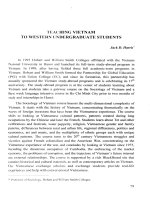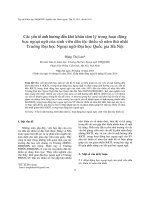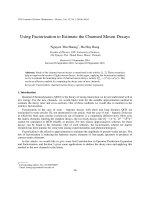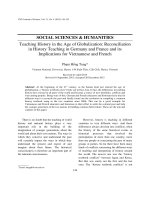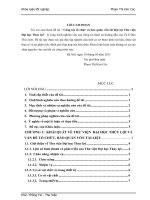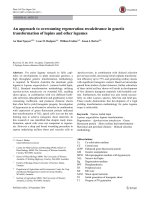DSpace at VNU: Teaching Vietnam to Western Undergraduate Students
Bạn đang xem bản rút gọn của tài liệu. Xem và tải ngay bản đầy đủ của tài liệu tại đây (4.75 MB, 7 trang )
TEACHING VIETNAM
TO WESTERN UNDERGRADUATE STUDENTS
Jack D. Harris
In 1995 Ilobart and William Smith Colleges affiliated with the Vietnam
Naional University in Hanoi and launched its full-term study-abroad program in
Viitnam. In 1999, after having fielded three full academic-term programs in
Viftnam. Hobarl and William Smith formed the Partnership for Global Education
(PCiE) with Union College (UC); and since its formation, this partnership has
aniually sponsored the Vietnam study-abroad programs and is celebrating its 17*
aniiversary. The study-abroad program is at the center of students learning about
Viilnam and students take a gateway course on the Sociology of Vietnam and a
thne week language intensive course in Ho Chi Minh City prior to two months of
siuly and internships in Hanoi.
The Sociology of Vietnam course honors the multi-dimensional complexity of
Vidnam. It starts with the history of Vietnam, concentrating thematically on the
wa'cs of foreign invasions that have been the Vietnamese experience. The course
shits to looking at Vietnamese cultural patterns, patterns created during long
occupations by the Chinese and later the French. Students learn about Tel and other
eehbrations and festivals, water puppetry, religion, Vietnamese gender and family
patems, differences between rural and urban life, regional differences, politics and
ecmomics, art and music, and the multiplicity of ethnic groups each with unique
culural patterns. The course turns to the 20* century Vietnamese struggles and
vicories against French colonialism and the American War, concentrating on the
Vietnamese experience of the war, and concludes by looking at Vietnam since 1975,
incuding the disastrous occupation of Cambodia, the embracing of the market
ecmomy, the problems of corruption, and the trajectory of Vietnam's future internal
am external relationships. The course is supported by a rich BlackBoard site that
cortains historical and cultural materials, as well as contemporary articles on Vietnam.
Ou' Vietnamese exchange scholars and exchange students provide real-life
cxfcriences and help with conversational Vietnamese.
Pofessor of Sociology, Hobarl and William Smith Colleges.
79
Vlf T NAM HQC - KY YfeU HQI
THAO Q U 6 C T E
LAN THlT TU
Thus, students going on the study-abroad program become re-cognizers of
social and cultural patterns and can place locations and events in historical and
political contexts. However, the course also provides a context for students to
ask their own questions and arrive at different conclusions than the inslrucor.
The pedagogy is straightforward: an enthusiasm for the subject and the counr},
combined with a sense of inquiry that places Vietnam in a relevant relation
to contemporary issues. For example, the course starts with the follow ng
propositions:
Why study Vietnam?
1. Vietnam is an ancient and sophisticated society and culture;
2. Vietnam is the 13th most populous nation in the world, with over 92
million people;
3. Vietnam has been historically important geographically, at the crossroads of
many other cultures. It is again important geographically and politically because of
its location in southeast Asia, especially its proximity to China;
4. Vietnam will expand its importance as a global trading partner based or its
rich natural and human resources;
5. Americans should study Vietnam to better understand our involvement m a
failed war;
6. Of all of the Asian nations, Vietnam best bridges east and west given their
almost 100 years of French influence;
7. Vietnam remains Communist-led, providing an opportunity to see the tensbns
between communism and the market-economy.
8. The effects of the global economy in Vietnam are much more apparent tian
in the United States.
Students come to understand Vietnamese historical and cultural patterns,
including those that represent conflict and contradiction. They look at Vietnam's
progression from a colony, to a communist stale, and to a free market econony.
Thus, students come to understand Vietnam's French colonial experience, the
American war and its aftermath, what life was like in a command and conrol
post-war communist society, and how that has changed by the development )f a
market economy.
In my view, based on this history of invasion and resistance, Vietnam s a
marvel of endurance and optimism. The primary reason for this, I think, is a culure
80
TEACHING VIETNAM TO WESTERN.
that has been indefatigably future-oriented. Fortune is the dream and hope for a
belter future, and the Vietnamese have been denied that fortune for a very long time.
1 he question remains, after impressive economic growth and more opportunities
for the good life, how are the Vietnamese to be and to live, when the future has
finally arrived?
In fact, contemporary Vietnam is not a settled place - there are substantial
areas of conflict, contradiction, and change. Students examine these sources of
conflict and contradiction and come to understand how political ideology and
autocracy may conceal conflicts and contradictions. Students are asked the following:
Where Are the Strains for Change and Which Way Will Vietnam Go?
o What is the Cultural Basis for Consensus and Change?
o What is the Political Basis for Consensus and Change?
o What is the Economic Basis for Consensus and Change?
o What about China?
Students seek to understand how Vietnamese live with conflict in such a
dynamic society, and what chances they assess for Vietnam's success.
The course is not exclusively for students who are going to study abroad in
Vietnam. The Sociology of Vietnam course is part of a larger Colleges-wide effort
to internationalize the campus, to engage students in the worlds of other societies
and their cultures, and to immerse students as participants and not simply visitors
and consumers when they are abroad. With support from a Mellon grant, and later a
US Department of Education Title VI grant, there has been considerable faculty
development and the dramatic expansion of our library holdings. As part of our
faculty development efforts, we now have a faculty member steering group for
Vietnam studies and a number of faculty have modified their courses (such as
Current Issues in Macroeconomics, What is Christianity, The Good City, and The
Politics of Development) to include Vietnam-related content. A student interested in
Vietnam may choose such courses as Sociology of Vietnam; Male and Female in
East Asian Societies and Cultures; Vietnamese Literature in Translation; Buddhism;
Feudal Women in France, Vietnam, and Japan or The War in Vietnam. To support
the program and to reach more students, the faculty has developed a web-based
product called IN FOCUS: Vietnam that highlights 15 mini-lectures on various
topics related to Vietnam history and culture. In addition to preparing students for
their trip to Vietnam, this course will have the benefit of preparing the students'
parents for their children's trip as well.
81
VI$T NAM HQC - KY YEU HQl THAO QU6C TE LAN THlT TU^
The design of the Vietnam program is to provide an integrative learning
experience, one that has pre- and post-sludy-abroad experiences. Students do not
simply parachute into a society unprepared, and students return home with the
expectation that they will, among other things, have opportunities to share their
knowledge with students in the public schools, write for a journal, and continue
course work, including self-instructional language study. Because of this we arrange
activities to coordinate with the courses include seminars, symposia, guest speakers,
musical events, art shows, and films, and have over the past several years hosted
exchange students and faculty from Vietnam with support from ASIANelwork and
The Board for Christian Higher Education in Asia.
While in Vietnam (on the study-abroad program), students attend presentations
provided by Vietnam National University faculty and specialists in respective fields
of the arts, and participate in field trips (to Hanoi-Halong Bay, the border region
near China, Ho Chi Minh City, Hue, Danang, and Hoi An) organized by the HWS
faculty director of the program. Students learn about Vietnamese history, aspects of
Vietnamese culture, and current social and political issues, as well as continue their
Vietnamese language instruction. In addition, students take a course taught by the
HWS faculty director, in the director's field of expertise, and design and implement
an independent field project or complete an internship. Independent projects are
diverse and range from studying Vietnamese traditional medicine (with the student
attending a course at the leading traditional medicine school, accompanied by a
translator, and visiting several traditional medicine practitioners) to working as an
intern at the American Embassy in the Foreign and Commercial Services area, to
studying Vietnamese street children and the social service and educational resources
available to them. Several students join the BRIDGE project which creates querybased lessons on Vietnamese topics for several classes in the Geneva elementary
schools.
We continue to build lasting relationships with VieUiamese and non-Vietnamese
academics and experts in a multitude of disciplines, as well as artists, musicians,
and lots of families, from north to south in Vietnam and also in the United States.
We also have committed to effective relationships with several Vietnamese
organizations that provide student and faculty support and opportunities for study
and internships while abroad. This web of relationships enlivens and enriches our
students' and faculty's experience and understanding of Vietnam on campus and
when abroad and brings Vietnam home.
82
TEACHING VIETNAM TO WESTERN...
The sociology of Vietnam:
conflict, colonialism, and catharsis
Description
In this course we explore the social world of Vietnam. We will study the
varied and complex history, culture and social relations of Vietnam. Through
our study of their institutions, arts, and artifacts, we will find ourselves immersed
in the life world of Vietnam, and are likely to achieve a fuller appreciation of
the modes and meanings of what it means to be Vietnamese, and what it means
to be American.
We examine the many forces of social relations that impinge on Vietnamese
life. This includes geography and geographic location, social institutions such
as kinship, village, religion, economy, education, and arts, tribal and ethnic
history and the continued influence of ethnic groups, and the diversity of its
urban and rural regions. In addition, we examine Vietnam's legacy of conflict and
colonialism, including the AmericanA^ielnam war and its human social, political
and environmental effects on the nation.
Finally, we explore at how the Vietnamese are negotiating and seeking to
reconcile and resolve the contradictions of socialist and capitalist theory and
practice, as they seek to improve the lives of its people, and position themselves
as a significant Southeast Asian political and economic force.
Course Objectives
(1) Develop a sophisticated sociological imagination as students engage in
study of a dissimilar culture;
(2) Learn to appreciate societal, cultural and sub-cultural diversity and an
interest in things and ways of life that are "different," acquiring the intellectual
tools to understand these other ways of life;
(3) Learn how their own national and social location influence their
assumptions and how they view the world;
(4) Become sensitive to issues of personal and social development, the
distribution of power and rewards and how the quality of social relationships is
everywhere a matter of concern;
(5) Become aware of how "modernity" has affected societies all over the
world and how the peoples of the world are becoming increasingly interdependent;
83
Vl£T NAM HQC - KY Y £ U H Q I THAO QU6C it LAN THlT TlT
(6) Become aware of thefransformativepower of sociological consciousness
and their role as world citizens and seek to arrive at an understanding of social
groups as well as exploring social problems and social-justice concerns;
(7) Become more sophisticated as observers, readers, and writers.
(8) Come to understand that ethics and morality require a careful and
deliberate analysis in heterogeneous, multi-cultural societies and cross-culluiral
relationships.
Methods of Evaluation
Your work will include 3 short (5 page) papers (60%) and a fourth and final
(10 page) paper (40%) and active participation in film discussions, guest lectures,
and seminars, and positive contributions to class discussion about readings.
Reading List
Ashwill and Diep, Vietnam Today
Borton, After Sorrow
Duiker, Sacred War: Nationalism and Revolution in a Divided Vietnam
Duong Thu Huong, Paradise of the Blind
Jamieson, Understanding Vietnam
Halberstam. The Making of A Quagmire
Koiko, Anatomy of a Peace
SarDesai, Vietnam: The Struggle for National Identity
Templer, Shadows and Wind: A View of Modem Vietnam
The Gioi, The Traditional Village in Vietnam
Course Outline:
/, History and Cultural Patterns
Readings: Jamieson, Understanding Vietnam, Chapter I
SarDesai, Vietnam..., Chapters I, 2
Duiker, Sacred War..., Chapters 1-4
2. Organization <& StructureReadings: Jamieson, Understanding Vietnam, Chapters 2-4
Tradition and Modernity:
The Gioi, The Traditional Village in Vietnam
84
TEACHING VIETNAM TO WESTERN..
3. The American War
Readings: SarDesai, Vietnam..., Chapters 5, 6
Its Aftermath
Duiker. Sacred War..., Chapters 3-7, Epilogue
Halberstam, The Making of a Quagmire
Jamieson. Understanding Vietnam, Chapters 5-7
Borton, After Sorrow
4. Contemporary Assessments:
Readings: Duong, Paradise of the Blind
Is Vietnam on the Right Path?
SarDesai, Vietnam..., Chapters 7-10
KoIko, Anatomy of a Peace
Templer, Shadows and Wind
Ashwill and Diep, Vietnam Today
Paper Topics and Due Dates:
Paper One: "Distinctive Aspects of Vietnamese History", Wednesday, Febmary 5
Paper Two: "Distinguishing Elements of Vietnamese Culture", Wednesday, March 5
Paper Three: "The American War: An Interpretation", Wednesday, April 9
Paper Four: "The Future of Vietnam & the Vietnamese", Tuesday, May 6
85
